King Crimson – Red (with sheet music)
provider: dailymotion
url: https://dai.ly/k24qDJWbw8HD0xxIvsR
src: https://geo.dailymotion.com/player.html?video=x88mq09&
src mod: https://geo.dailymotion.com/player.html?video=x88mq09
src gen: https://geo.dailymotion.com/player.html?video=k24qDJWbw8HD0xxIvsR
Red is the seventh studio album by English progressive rock band King Crimson. It was released on 6 October 1974 through Island Records in the United Kingdom and Atlantic Records in North America and Japan. The album was recorded at Olympic Studios in London in July and August 1974, and produced by the band themselves.
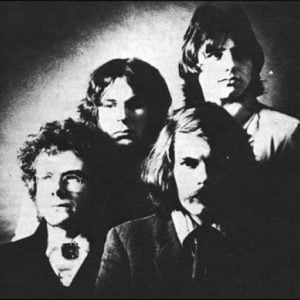
Personnel
King Crimson – production, arrangements
- Robert Fripp – electric guitar (1–5), acoustic guitar (2), Mellotron (2,4-5), Hohner pianet (5)
- John Wetton – bass (1–5), vocals (2–3, 5)
- Bill Bruford – drums (1–5), percussion
The track “Providence” was a free improvisation recorded at their 30 June 1974 concert at the Palace Theater in the city of the same name. Parts of some of the pieces were conceived during previous improvisations performed by the band live. “Starless” was originally considered for their previous album, Starless and Bible Black (1974), but was considered incomplete at the time. The lengthy version included on this album was refined and performed during concerts throughout 1974.
Red is a progressive rock album with a noticeably heavier sound than their previous albums; it was later called one of the 50 “heaviest albums of all time” by Q. This was achieved with the performances of just three band members: guitarist Robert Fripp, bassist and vocalist John Wetton and drummer Bill Bruford. The dense sound of the album was achieved by significant layering, multiple guitar overdubs, and key guest appearances by musicians including founding King Crimson member Ian McDonald, classical oboist Robin Miller and English jazz trumpeter Marc Charig.
Roughly two weeks prior to the release of Red, King Crimson disbanded. The album turned out to be their lowest-charting album at that time, spending only one week in the UK Album Chart at No. 45 and the US Billboard 200 at No. 66. However, it was well received among fans and critics. It has received further praise retrospectively, being recognized as one of the band’s best works, and has been re-issued many times.
Near the conclusion of King Crimson’s 1974 US and Canada tour, the decision was made to ask David Cross to leave the band. EG, the band’s management, urged Fripp not to tell Cross until after the final date of the tour, but he would not be able to do this anyway; Fripp would not return from the United States until after Cross would return to Europe. Fripp reached an agreement with EG management that they would tell Cross, “on proviso that [Cross] is told that I objected to not telling him personally.”
Despite reaching this agreement, Cross would not be told by EG until the day before the recording of Red began. In his stead, the band brought back several contributors to past albums: Robin Miller on oboe, Marc Charig on cornet, former King Crimson members Ian McDonald and Mel Collins on saxophones, as well as an uncredited cellist and acoustic bassist.
Red sees King Crimson follow in the direction established by their previous two albums, Larks’ Tongues in Aspic and Starless and Bible Black, but in contrast to those albums, Red features more layered production with multiple overdubs, as well as the return of the earlier instrumentation of the guest players. Red’s heavier tone was largely due to the influence of the rhythm section, Wetton and Bruford, whom Fripp has referred to as “a flying brick wall”.
During the recording of the album, Fripp took a “backseat” when making large decisions. He had decided to take “a year’s sabbatical … at Bennett’s Institute,” and offered the idea of McDonald rejoining the band in his absence to EG. When this idea was met with disinterest, Fripp abruptly disbanded King Crimson on 24 September 1974, and Red was released two weeks later.
Best Sheet Music download from our Library.
Writing and recording
Much of the material on Red has origins in improvisation. Motifs that would eventually be used for “Fallen Angel” were first played by Robert Fripp in 1972, as part of improvs performed with the quintet lineup that would record Larks’ Tongues In Aspic. These improvisations are documented as “Fallen Angel” and “Fallen Angel Hullabaloo” in the Larks’ Tongues in Aspic: The Complete Recordings box set, as well as standalone releases of their respective concerts.
The distinctive introduction to “One More Red Nightmare” was also deployed by John Wetton and Robert Fripp in various improvs throughout 1974, which can be heard in the Starless (box set) and The Road to Red box sets. One notable performance is titled “The Golden Walnut”. Lastly, “Providence” itself was an improv, taken from the group’s show on 30th June in Providence, Rhode Island. It was included in its uncut form as part of various live sets, such as The Great Deceiver, as well as the 40th Anniversary Edition of Red itself.
“Red” was composed solely by Robert Fripp. In an analysis of the piece by Andrew Keeling, he describes “Red” as “an instrumental piece scored for electric guitar (multi-tracked in three layers), bass guitar and drums,” as well as “one of the more muscular pieces of Robert Fripp’s, in particular the deployment of open strings and heavily attacked and syncopated bass and drums.” In an online diary from 2012, Robert Fripp speaks about the development of “Red”: “A motif; moved from [the missing piece] “Blue” to “Red”: the opening and closing theme of “Red” itself.
The driving, relentless figure that follows it, and the middle figure played by the basses, weren’t enough for a complete piece.” Speaking about it in the book accompanying the Larks’ Tongues in Aspic: The Complete Recordings box set, he says, “After we had just recorded the track “Red” in [Olympic Studios] … we played it back and Bill said, ‘I don’t get it, but if you tell me it’s good, I trust you.’ … I said, ‘We don’t have to use it.’ John was in no doubt: ‘We’ll use it.’”
An unused variation of the song’s middle section would later emerge in 1983, during the writing rehearsals for Three of a Perfect Pair. Though it went unused, it finally saw light in 1995, more than two decades later, as the middle section of the instrumental “VROOOM VROOOM” on THRAK.
“Starless” was originally written by Wetton, with the intent of it being the title track for Starless and Bible Black. At the time, the piece consisted only of the vocal section of the song, and Wetton claims that it got a “cold reception” from both Robert Fripp and Bill Bruford. Later, an introductory theme was written by Robert Fripp and performed on violin by David Cross, and two additional sections were added after the vocal, one being contributed by Bruford. The final section reprises various themes from earlier in the song, and it also re-uses a bass part which was originally written for the song “Fracture”.
This early arrangement of “Fracture” can be heard on discs 1 and 25 of the Starless box set, as well as the standalone releases of their respective concerts. The lyrics went through several iterations, with one early verse later included by Wetton in “Caesar’s Palace Blues,” a song he would perform with U.K. Since the title “Starless and Bible Black” was already used for an improvisation on the group’s previous album, the song’s title was shortened to “Starless”. On Red, “Starless” is credited to the quartet, as well as lyricist Richard Palmer-James.
The lyrics to the three songs on the album were not originally included as part of the packaging for the album, unlike all previous Crimson studio albums, which always had lyrics printed either on the inside of the gatefold covers, or on the custom innersleeves. This led to some occasional confusion amongst listeners about precisely what was being sung, particularly on the song “One More Red Nightmare.” The first printing of the lyrics would occur 26 years after the album’s initial release, on the 2000 ’30th Anniversary Edition’ release.
Release and reception
Released in October 1974, Red spent only one week on the British charts, at No. 45, whereas all the band’s previous studio albums had reached the Top 30. In the United States, it reached No. 66 on the Billboard 200. However, it remained a popular album with fans and critics.
Retrospective reviews were resoundingly positive. In theirs, AllMusic declared Red to be weaker than its two predecessors, but nonetheless a superlative work: “few intact groups could have gotten an album as good as Red together.
The fact that it was put together by a band in its death throes makes it all the more impressive an achievement.” Robert Christgau also applauded the album, having been generally critical of the group’s past work, calling it “Grand, powerful, grating, and surprisingly lyrical” and commenting that “this does for classical-rock fusion what John McLaughlin‘s Devotion did for jazz-rock fusion.” Classic Rock reviewer considered Red “a walk down a lightless corridor and an unhappy and ferocious counterbalance to the frolics of King Crimson’s beginnings”, and described it as “dark, brooding and laden with heavily distorted sections and a decidedly melancholic vibe”.
Download the best scores from our Sheet Music Library.
Like most of King Crimson’s catalogue, Red has been re-released numerous times since 1974. First issued on Compact Disc in 1986, it has also been released as part of the “Definitive Edition” series in 1989, and the “30th Anniversary Edition” series in 1999. In 2009, Red was chosen, alongside In the Court of the Crimson King and Lizard, to launch the “40th Anniversary Edition” series.
As part of this series, each album is presented in a CD/DVD-A package, with new stereo and 5.1 surround mixes crafted by Steven Wilson. Unlike the other editions in the series, however, Red launched with no new stereo mix. In 2013, Wilson and Fripp created a new stereo mix for The Road To Red boxed set, and this mix was also issued separately as part of a 2CD package.
Legacy
In 2001, Q magazine named Red as one of the “50 Heaviest Albums of All Time” and Pitchfork ranked Red number 72 in its “Top 100 Albums of the 1970s” list, stating that “For a band that was very obviously about to splinter, King Crimson’s music sounds remarkably of a single mind. On Red, they achieved a remarkable balance between bone-crushing brutality and cerebral complexity.” Rolling Stone ranked the album at number 15 on their list of the 50 best progressive rock albums of all time. Kurt Cobain had reportedly cited the album as a major influence.
“Red” was covered by Canadian rock band Glueleg in their 1994 debut Heroic Doses, with this version featuring saxophone and trumpet. “Red” was also ranked as the twentieth best progressive rock song of all time by PopMatters, as well as number 87 in Rolling Stone‘s list of “The 100 Greatest Guitar Songs”. Additionally, “Red” has been considered an influence on avant-garde metal.
Musicologists Eric Tamm and Edward Macan both consider Red, particularly the track “Starless“, to be the highlight of King Crimson’s recorded output. “Starless” is played over the opening titles of the 2018 horror film Mandy.
Browse in the Library:
| Artist or Composer / Score name | Cover | List of Contents |
|---|---|---|
| Antonio Carlos Jobim – Luiza Guitar Arr with Tablature |
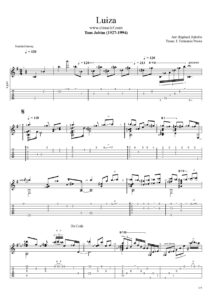 |
|
| Antonio Carlos Jobim – One Note Samba (Guitar Arr.) |
 |
|
| Antonio Carlos Jobim – One Note Samba (guitar TABS sheet music) | Jobim – One Note Samba (guitar TABS sheet music) | |
| Antonio Carlos Jobim – Samba De Uma Nota So | ||
| Antonio Carlos Jobim – Se Todos Fossem Iguais A Voce arr. by Baden Powell (Guitar arr. sheet music with TABs) | Antonio Carlos Jobim – Se Todos Fossem Iguais A Voce arr. by Baden Powell (Guitar arr. sheet music with TABs) | |
| Antonio Carlos Jobim – Tom Jobim For solo Guitar with TABs |
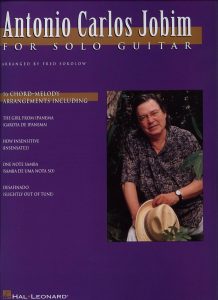 |
Tom Jobim for Solo Guitar |
| Antonio Carlos Jobim – Triste (Guitar Solo Arr. With Tabs Sheet Music) (Musescore File).mscz | ||
| Antonio Carlos Jobim 9 Pieces Guitar TABs |
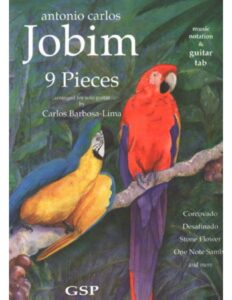 |
Jobim 9 pieces guitar |
| Antonio Carlos Jobim And Chico Buarque Eu Te Amo (Arr. For Guitar By Carles Trepat) |
 |
|
| Antonio Carlos Jobim and the art of Bossa Nova Jazz Play Along Volume 08 with audio MP3 |
 |
Antonio Carlos Jobim Jazz Play-Along Volume 08 – with audio MP3_compressed |
| Antonio Carlos Jobim Anthology (Piano vocal and guitar) |
 |
Antonio Carlos Jobim Anthology (Piano vocal and guitar) |
| Antonio Carlos Jobim for Classical Guitar (Paulo Bellinati Mel Bay 2008) |
 |
Antonio Carlos Jobim for Classical Guitar |
| Antonio Carlos Jobim Jazz Piano solos Vol. 17 |
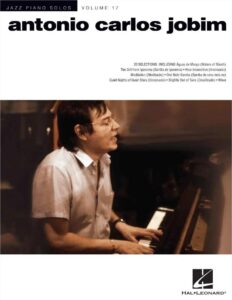 |
Antonio Carlos Jobim Jazz Piano solos Vol. 17 sheet music pdf |
| Antonio Carlos Jobim Jazz Play Along Vol. 08 with audio MP3 |
 |
Antonio Carlos Jobim Jazz Play-Along Volume 08 – with audio MP3_compressed |
| Antonio Carlos Jobim Quebra Pedra (Stone Flower) – Tom Jobim Piano and Guitar chords |
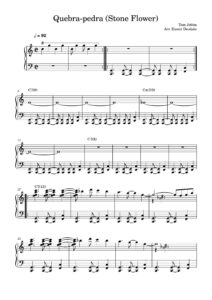 |
|
| Antonio Carlos Jobim Stone Flower (Songbook) Quebra-pedra Tom Jobim Piano Vocal guitar Chords |
 |
Antonio Carlos Jobim Stone Flower (Songbook) Tom Jobim Piano Vocal guitar Chords |
| Antonio Carlos Jobim Tom Jobim – Luiza Guitar Solo |
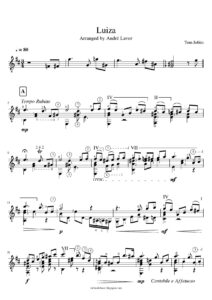 |
|
| Antonio Carlos Jobim Tom Jobim Corcovado arr. for Guitar Violao by Rubinho | Antonio Carlos Jobim Tom Jobim Corcovado arr. for Guitar Violao by Rubinho | |
| Antonio Carlos Jobim Wave (Piano Guitar) |
 |
Antonio Carlos Jobim Wave (Piano Guitar) |
| Anywhere the heart goes (The Thorn birds – Uccelli di rovo) | ||
| Aphex Twin – aisatsana |
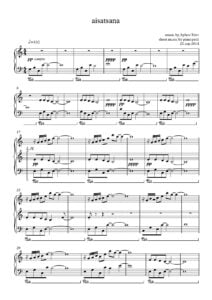 |
|
| Aphex Twin – Avril 14th |
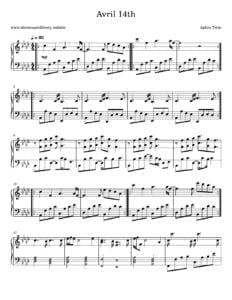 |
|
| Aphex Twin – Avril 14th (Musescore File).mscz | ||
| Aphex Twin – Kesson Daslef |
 |
|
| April In Paris Vernon Duke E.Y. Harburg 1932 Jazz Standard (Vintage sheet music) |
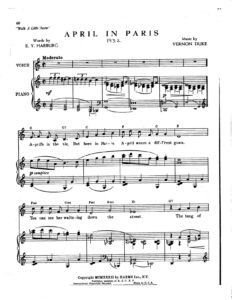 |
|
| Aqua – Doctor Jones | ||
| Aquaman Everything I Need Skylar Grey Piano solo |
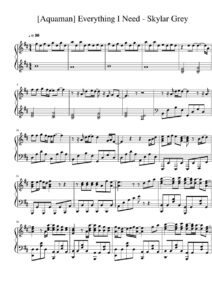 |
|
| Aram Khachaturian – Sabeltanz Aus Gayaneh (Pianoforte 4 hands) | Aram Khachaturian – Sabeltanz Aus Gayaneh (Pianoforte A 4 Mani) | |
| Aranjuez Ma Pensee (ver. for voice and guitar by the composer) |
 |
Aranjuez Ma Pensee |
| Aretha Franklin – Chain Of Fools | ||
| Aretha Franklin – Respect | ||
| Aretha Franklin Songbook |
 |
Aretha Franklin Songbook |
| Aretha Franklin Songbook 1 |
 |
Aretha Franklin Songbook 1 |
| Aretha Franklin Songbook 2 |
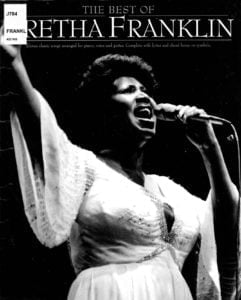 |
Aretha Franklin Songbook 2 |
| Aretha Franklin The Very Best of The 60s |
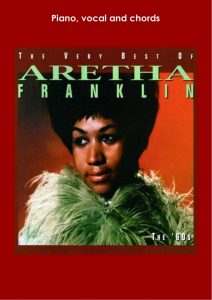 |
Aretha Franklin best of 60s |
| Ari Hoenig Songbook |
 |
Ari Hoenig Songbook |
| Ari Pulkkinen – Angry Birds Theme Song | Ari Pulkkinen – Angry Birds Theme Song | |
| Aria (Cantilena) by Heitor Villa-Lobos.mscz | ||
| Aria di neve (Sergio Endrigo) | ||
| Ariana Grande – 7 Rings Sheet Music |
 |
|
| Ariana Grande – Bang Bang Sheet Music piano Vocal Guitar chords |
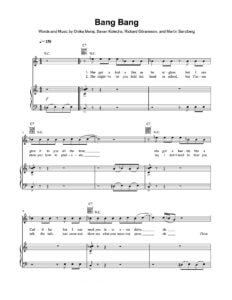 |
|
| Ariana Grande – No Tears Left to Cry Sheet Music |
 |
|
| Ariana Grande Tattooed Heart | Ariana Grande-Tattooed heArt | |
| Ariel Ramírez – Alfonsina Y El Mar (Guitar) arr. by Roland Dyens | Ariel Ramírez – Alfonsina Y El Mar (Guitar) arr. by Roland Dyens | |
| Ariel Ramírez – Alfonsina Y El Mar (Piano) | Ariel Ramírez – Alfonsina Y El Mar (Piano) | |
| Arlen, Harold Stormy weather – piano | Stormy weather – piano | |
| Armageddon (Piano & Guitar Chords) |
 |
Armageddon (Piano & Guitar Chords) |
| Arnold Schoenberg, Gerald Strang, Leonard Stein-Fundamentals of Musical Composition-Faber & Faber (1982) Book |
 |
|
| Around The Campfire Peter, Paul and Mary – Guitar songbook |
 |
Around The Campfire Peter Paul & Mary songbook |
| Arpeggios For The Modern Guitarist Tabs by Will Johnson |
 |
Arpeggios For The Modern Guitarist Tabs by Will Johnson |
| Arranging And Composing for the small ensemble Jazz R&B Jazz-Rock (by David Baker) |
 |
|
| Arrival Of The Birds from The Crimson Wing Mystery of the Flamingos piano solo |
 |
|
| Arrival Of The Birds The Theory of Everything – The Cinematic Orchestra Piano Solo |
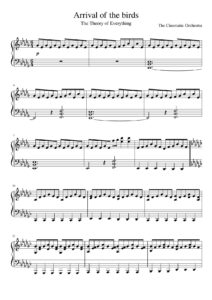 |
|
| Arrival Of The Birds The Theory of Everything Ending Scene Music – The Cinematic Orchestra Piano Solo |
 |
|
| Art Blakey And The Jazz Messanger Bobby Timmons – Moanin’ |
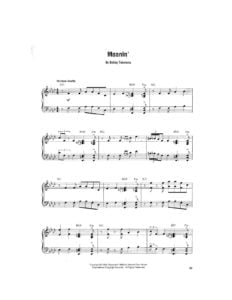 |
|
| Art Of Composing Music (Published In London (1751) |
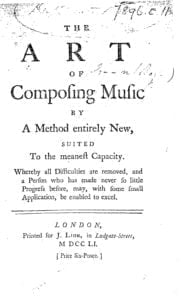 |
|
| Art Of Gospel Guitar – El McMeen with Tablature |
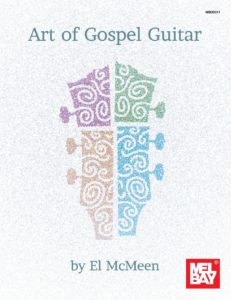 |
Gospel guitar |
| Art of Jazz improvisation book 3 Intermadiate by Bob Taylor |
 |
|
| Art Pepper Collection Solos Artist Transcriptions Saxophone |
 |
art pepper solos sheet music |
| Art Tatum As Time Goes By |
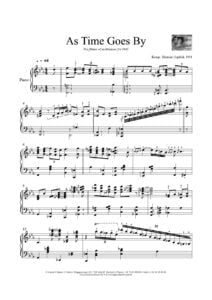 |
|
| Art Tatum – Tiger Rag (Jazz Standard by the Original Dixieland Jass Band) (piano sheet music) | Art Tatum – Tiger Rag (Jazz Standard by the Original Dixieland Jass Band) (piano sheet music) | |
| Art Tatum – All The Things You Are |
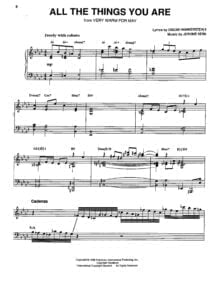 |
|
| Art Tatum – Cherokee |
 |
|
| Art Tatum – Gershwin – The Man I Love (Piano as played by) | Art Tatum Gershwin The-Man-I-Love-Piano | |
| Art Tatum – Jazz Piano solos Vol. 2 |
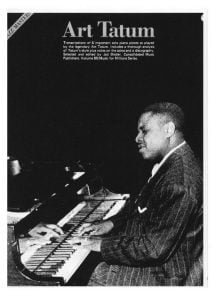 |
Art Tatum Jazz piano solos vol. 2 |
| Art Tatum – New Beginnings A Piano Imrovisation | Art Tatum – New Beginnings A Piano Imrovisation | |
| Art Tatum – Tea For Two (Sheet Music) (Musescore File).mscz | ||
| Art Tatum – Tiger Rag (Sheet Music) (Musescore File).mscz | ||
| Art Tatum – Too Marvelous for Words The Life and Genius of Art Tatum (Book by James Lester) |
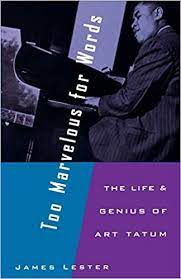 |
|
| Art Tatum 5 Jazz Piano Solos transcribed By Frank Paparelli |
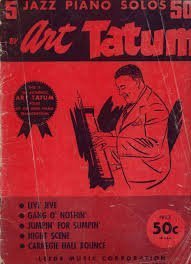 |
Art Tatum 5 Jazz Solos By Frank Paparelli – 1944 Songbook |
| Art Tatum Artist Transcriptions Solo Book |
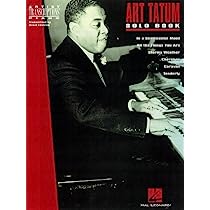 |
Art Tatum |
| Art Tatum Improvisations Piano sheet music |
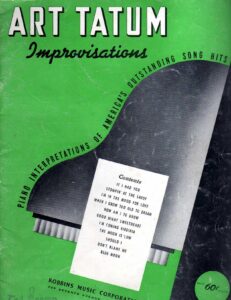 |
Art Tatum Improvisations Piano sheet music |
| Art Tatum Jazz Arr. Begin The Beguine (Musescore File).mscz | ||
| Art Tatum Jazz Arr. Cole Porte Begin The Beguine |
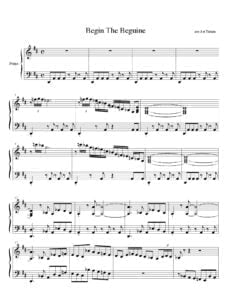 |
|
| Art Tatum New Beginnings (Musescore File).mscz | ||
| Art Tatum Stormy Weather Ted Koehler – Harold Arlen | T.Koehler-H.Arlen – Stormy Weather (arr. A.Tatum) | |
| Art Tatum Tea For Two (Vincent Youmans) |
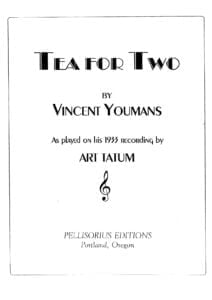 |
|
| Arthur A. Reblitz – Piano servicing, tuning, and rebuilding for the professional, the student, and the hobbyist |
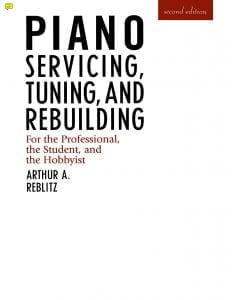 |
|
| Artic Monkeys – Only Ones Who Know | ||
| Artie Shaw – Jazz Technic Book 1 Scales and Exercises |
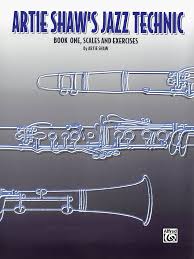 |
Artie Shaw – Jazz Technic Book 1 Scales and Exercises |
| Artie Shaw – Clarinet Method |
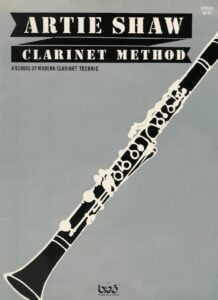 |
|
| Artie Shaw – Concerto for Clarinet for solo Bb Clarinet with Piano accompaniment |
 |
|
| Artie Shaw – Moonglow Clarinet sheet music |
 |
|
| Artie Shaw His Life And Music by John White (Book) Biography |
 |
|
| Artpop Lady Gaga Songbook |
 |
|
| Arturo Sandoval – Sandunga Alto Sax | Arturo Sandoval – Sandunga Alto Sax | |
| Arturo Sandoval – Trumpet Method |
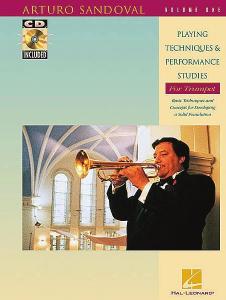 |
|
| Arvo Part Fratres Piano Sheet music |
 |
|
| Arvo Pärt Partita For Piano, Op 2 (1960) |
 |
|
| Arvo Pärt Spiegel Im Spiegel (Violoncello And Piano) |
 |
|
| Arvo Part Summa for Strings | Arvo Part Summa for Strings | |
| Arvo Part – Fur Alina Variations | Arvo Part – Fur Alina Variations | |
| Arvo Pärt – Zwei Sonatinen Für Klavier Op. 1 |
 |
|
| Arvo Pärt Out Of Silence (Peter C. Bouteneff) Book |
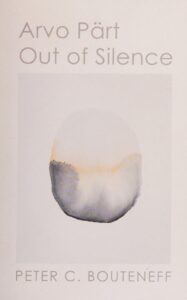 |
|
| Arvo Pärt Sounding The Sacred Book by Peter C. Bouteneff Jeffers Engelhardt Robert Saler |
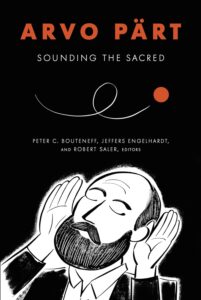 |
|
| Arvo Pärt Spiegel Im Spiegel (arranged for Piano Solo) | Arvo Pärt – Spiegel Im Spiegel (arranged for Piano Solo) | |
| Arvo Pärt Spiegel Im Spiegel Violin Piano |
 |
|
| Ary Barroso – Amor Fatal Fox triste (piano) |
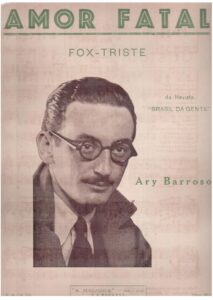 |
|
| Ary Barroso – Aquarela Do Brasil (Samba) Guitar Solo |
 |
|
| Ary Barroso – Aquarela Do Brasil (Samba) Guitar Solo TABs |
 |
|
| Ary Barroso – Aquarela Do Brasil (Samba) Guitar Solo.mscz | ||
| Ary Barroso – Aquarela do Brasil Piano Vocal | Ary Barroso-Aquarela do Brasil | |
| Ary Barroso – Tenho Saudade! Samba Cançao (piano) |
 |
|
| Ary Barroso Aquarela Do Brasil Arr Carlos Barbosa Lima for guitar | Ary Barroso Aquarela Do Brasil Arr Carlos Barbosa Lima for guitar | |
| Ary Barroso Guitar 1 songbook (arr. by Almir Chediak) |
 |
Ary Barroso Guitar 2 songbook (arr. by Almir Chediak) |
| Ary Barroso Guitar 2 songbook (arr. by Almir Chediak) |
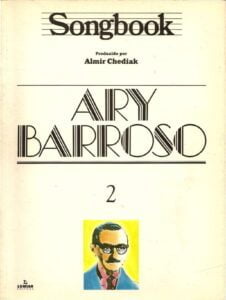 |
Ary Barroso Guitar 2 songbook (arr. by Almir Chediak) |
| As 101 Melhores Canções Do Século XX – Vol 2 – Almir Chediak (Guitar) |
 |
As 101 Melhores Canções Do Século XX – Vol 2 |
| As 101 melhores cançoes do século XX Vol. 1 (Almir Chediak) |
 |
As 101 Melhores Canções Do Século XX – Vol 2 |
| As Time Goes By (Musescore File).mscz | ||
| Ashanti – The Way That I Love | ||
| Asking you (Green Card OST) Hans Zimmer | ||
| Assassin’s Creed Rogue – Main Theme |
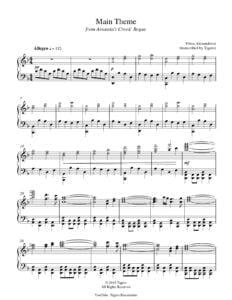 |
|
| ASSASSINS – The Musical Sondheim-Weidman (Piano & Vocal) |
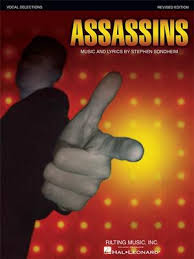 |
ASSASSINS – The Musical Sondheim-Weidman (Piano & Vocal) |
| Assassins Creed 2 – Ezios Family |
 |
|
| Assassins Creed III Main Theme |
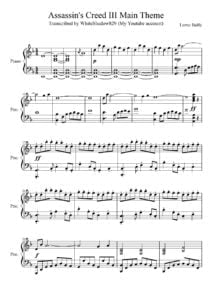 |
|
| Astor Piazolla – Adios Nonino | ||
| Astor Piazolla Libertango Violin And Piano | Astor Piazolla Libertango Violin And Piano | |
| Astor Piazzola – Libertango (piano arr.) |
 |
|
| Astor Piazzola – Libertango (Piano Solo) |
 |
|
| Astor Piazzola – Play Piazzolla 13 Tangos By Astor Piazzolla EASY GUITAR ARR. |
 |
Astor Piazzola – Play Piazzolla 13 Tangos By Astor Piazzolla EASY GUITAR ARR. |
